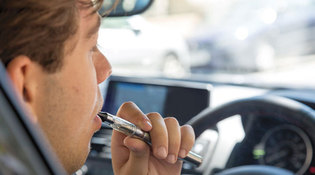 loading
loading
FindingsNotedIf you want to cooperate with others, Yale psychologists Adam Bear and David Rand have some contrarian advice: don’t think. In a computer model they created to simulate people making decisions, “participants” played prisoners’ dilemma games (in which players must choose whether to cooperate at a potential loss). Bear and Rand found that deliberating about whether to cooperate was the surest way to defeat altruistic tendencies. Writing in the January 26 PNAS, they concluded that deliberation does not help to “forgo . . . selfish impulses” but rather “undermines the impulse to cooperate.”
 ShutterstockView full imageThe alcohol present in some of the liquid mixtures vaporized in e-cigarettes may impair motor dexterity, psychiatry department researcher Mehmet Sofuoglu and his colleagues have found. They compared the effects of commercially available e-liquids that were either 0.4 percent or 23.5 percent alcohol. The young adults participating in the study didn’t report feeling buzzed, but their performance on a dexterity test dropped significantly when they used the high-alcohol liquid—suggesting that vaping and driving may not always mix. The results appeared in the online Drug and Alcohol Dependence.
Call it the goldilocks phenomenon. A protein called MIF (macrophage migration inhibitory factor), released by white blood cells, is essential for boosting the immune response to disease. But when too much MIF is produced, the resulting excess can cause autoimmune ailments such as lupus and rheumatoid arthritis—as well as infectious diseases and cancer. Professor of Medicine Richard Bucala and his colleagues have now found the protein that controls exactly how much MIF is produced by an individual’s MIF gene. The finding, reported in the Journal of Clinical Investigation, may lead to potentially lifesaving drug treatments.
The comment period has expired.
|
|